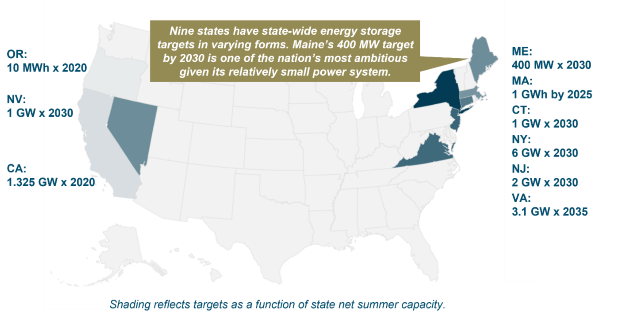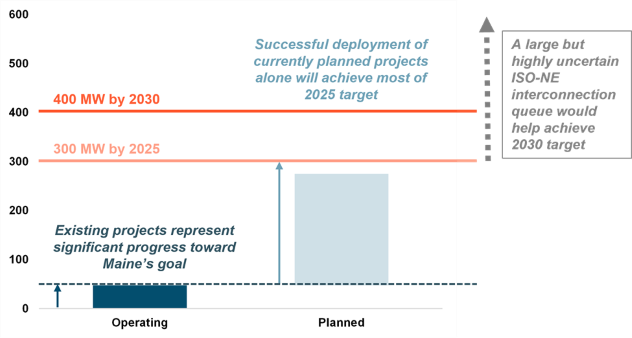Technologies that store electricity to be used to meet demand at different times can provide significant benefits to the grid and its resiliency. Energy storage can provide backup power during outages and can help customers and grid operators manage electric load. Energy storage can also help increase the availability of renewable energy from sources like wind and solar by absorbing excess energy when it is being produced, then discharging it later when the energy is needed. Learn more about energy storage from the U.S. Department of Energy.
Maine's Energy Storage Goals
In June 2021, Governor Mills signed Public Law 2021 Chapter 298 (LD 528 - An Act To Advance Energy Storage in Maine). This legislation set goals for energy storage in Maine and directs multiple important steps to advance its deployment to the benefit of Maine. The State of Maine has established in statute the following goals for energy storage capacity installed within the state:
- 300 megawatts by the end of 2025
- 400 megawatts by the end of 2030.
These targets established Maine as the ninth U.S. state with codified energy storage targets, targets that are some of the most ambitious in the country given the relative size of the state’s electricity load with 400 megawatts representing nearly 20 percent of Maine’s peak demand in 2021.

The legislation requires the Governor’s Energy Office (GEO; now the Maine Department of Energy Resources or DOER) to update the state’s energy storage goals beginning in 2027 as needed to align with Maine’s emissions reduction and renewable portfolio standard requirements.
GEO was required by L.D. 528 to conduct an energy storage market assessment, including opportunities for stakeholder input, to inform the achievement of the state’s energy storage goals and related policy objectives.
Energy Storage Market Assessment
To complete the Maine Energy Storage Market Assessment, GEO retained Energy & Environmental Economics (E3), a consultancy with extensive experience providing technical analysis to clients across all sectors of the electricity industry including utilities, regulators, policy makers, developers, and investors.
Learn more and read the Maine Energy Storage Market Assessment here.
The report reviews the opportunities and challenges faced by the state in achieving its energy storage goals. It evaluates current and emerging storage technologies, assesses the market and policy landscape and hurdles to deployment, and includes a cost-benefit analysis of certain storage applications. E3, with support from GEO, engaged with more than 100 stakeholders representing utilities, industry, customers, state legislators, regulators, environmental groups, and other interested parties who participated through public webinars and by sharing feedback that informed study development.
In 2020, the state’s four-year climate action plan, Maine Won’t Wait, identified storage as an important factor in achieving emissions reduction goals and maximizing the value of renewable energy on the grid. This report underlines energy storage as a vital complement to the state’s broader climate and clean energy targets, particularly as Maine increases its use of renewable energy generation and electrifies transportation and buildings to support its decarbonization goals.
The assessment shows that both grid-connected storage and customer-sited storage have the potential to provide many benefits to Maine’s electric grid and customers, particularly through the ability to shift electricity from when it is generated to when customers need it most. Storage can help lower wholesale electricity costs, lower utility infrastructure costs, and lower electricity bills while increasing resiliency and helping integrate more renewable energy.
The report also notes that Maine is already on its way toward meeting its ambitious targets with 50 megawatts of storage capacity operating in the state at the beginning of 2022 and more in development.

Energy Storage for Maine homes and businesses
Additionally, L.D. 528 directs the Efficiency Maine Trust to incorporate energy storage technologies into its electric efficiency and conservation program offerings. To learn more as these programs develop, visit the Efficiency Maine Trust website.
The legislation also directs the Efficiency Maine Trust to establish a specific pilot program to deploy energy storage for hospitals, fire departments, emergency medical services, police and public safety buildings, emergency shelters, and other facilities providing critical care. This pilot program will contribute to the important effort of increasing resiliency, ensuring communities have the energy resources needed to withstand weather-related or other emergency outages made even more serious by climate change.
Efficiency Maine Trust also manages Innovation Pilot Programs that may include energy storage technologies.
Energy Storage in Maine's Electricity Markets
Energy storage is eligible to participate in the renewable energy procurements signed into law in June 2019 and June 2021. More information can be found at the Public Utilities Commission. The Public Utilities Commission was also directed by the Act to study rate design changes that can enhance the value of energy storage, and to evaluate the feasibility of a power-to-fuel pilot program.
As of February 2026, Maine had nearly 240 megawatts of energy storage capacity and hundreds of megawatts of additional planned projects in the ISO-NE interconnection queue.
Operating Grid-Connected Storage Projects in Maine* (updated Feb. 2026)
| Plant Name | County | Online Date | Capacity (MW) | ||
| William F Wyman | Cumberland | 12/31/2016 | 16.7 | ||
| Madison BESS | Somerset | 5/30/2019 | 4.7 | ||
| Great Lakes Millinocket Battery | Penobscot | 12/31/2020 | 20.9 | ||
| Industrial Drive Rumford BESS project | Oxford | 7/1/2021 | 4.8 | ||
| Bonny Eagle Renewable BES | York | 04/20/2023 | 8 | ||
| Rumford Renewable BES | Oxford | 5/5/2023 | 8 | ||
| Cross Town Energy Storage | Cumberland | 2/11/2026 | 175 | ||
| Total | 238.1 | ||||
Source: ISO-NE CELT report.
Energy Storage Commission
The 129th Maine Legislature established the Commission to Study the Economic, Environmental and Energy Benefits of Energy Storage to the Maine Electricity Industry with the passage of Resolve 2019, chapter 83. This Commission met in 2019 and produced a final report that can be found here.
Energy Storage Forum
As recommended by the Energy Storage Market Assessment, the Governor's Energy Office convened an Energy Storage Forum from 2022-2023. Learn more about the Energy Storage Forum here.